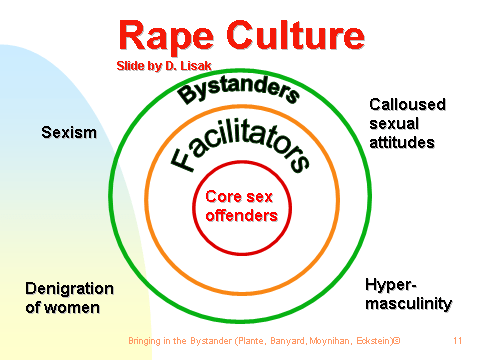Bolded emphasis mine:
Here, too, is a common narrative of the rape culture: If someone is a “good person,” he can’t possibly be a rapist. (And the corollary: If someone is a rapist, then he will show no evidence of being a “good person.”) Humans, even rapists, are complex entities. A rapist is capable of doing good things for some people, while doing grave harm to others. In Sandusky’s case, what appeared to be (and in some cases maybe actually was) good works was simultaneously the grooming of victims.
That should underscore the danger of narratives like, “He’d never do that; he’s such a nice guy.” I hope the sports writers who are rightfully taking Sandusky’s defense to task for this bullshit (but typical) line of defense remember that next time an adult woman brings charges against a professional sports hero who’s done charity work, instead of immediately accusing her of lying because “he’s a such a nice guy.” Rapists do charity work, too.
This slide by David Lisak illustrates how rape culture tropes work to camouflage rapists in the midst of facilitators and bystanders:
Cultural Aspects of Rape As Reported by Dr. David Lisak
Characteristics of Core Sex Offenders
- See “intimate” violence as normal
- Have deficits in empathy
- Believe in rape myths
- Hyper-masculine attitudes
- Angry at women & need to dominate
Facilitators perpetuate an environment that allows core sex offenders to assault
- Reinforce negative behavior
Bystanders have knowledge of incidents & dangerous environments, but fail to act
Core Sex Offenders can’t be rehabilitated by education or other forms of outreach; they must be isolated from their peers and the community.
Source: USAF Sexual Assault Prevention Program (Powerpoint)
In other news, the timing of particular actions is being noted:
Oddly enough, as Tropes vs Women and sexual assault enter the discussion, TVTropes removes pages like RapeAsBackstory. tvtropes.org/pmwiki/pmwiki.…
— M.H. Williams (@AutomaticZen) June 18, 2012
Luckily, the Wayback Machine has our back:
#foryourbookmarks Last #waybackmachine crawl of now-deleted _TV Tropes | Rape As Backstory_ from July ’11 – wayback.archive.org/web/*/http://t…
— Viv Smythe (@vivsmythe) June 19, 2012
You can also pull the googlecache of the most recent version of the deleted TV Tropes RapeAsBackStory page here for future reference (make a copy before the googlecache is updated to show the current deletion message).
Categories: ethics & philosophy, law & order, social justice, violence

 Follow @ShaunKing to see how President-Elect Trump has emboldened haters
Follow @ShaunKing to see how President-Elect Trump has emboldened haters  Friday Hoyden: Gillian Triggs
Friday Hoyden: Gillian Triggs  Media Circus: No Snappy Title edition
Media Circus: No Snappy Title edition  DUFC #69
DUFC #69
There seems to be a general refusal of the general public to believe that people can do both good and bad acts. People seem to want to believe that people are either good or bad, whereas in truth most people are a mix of both throughout their life. Recent examples being Assange (allegedly at this stage) or the guy who was awarded a bravery medal for what he did during the Victorian bushfires and then later seriously assaulted his wife.
Its almost like its too hard for people to cope with simultaneously admiring and rewarding someone for one act and being critical and punishing them them for another.
I think it is time we ended the ‘but no one will want to be a coach/teacher/priest/whatever if they think everyone will assume they are a pa*d*phile’ and called bullshit on it. Some children are abused by their parents yet people still choose to have children thereby taking the risk that someone might think they are a child abuser. So I think that people will still choose to be coaches/teachers/priests/whatever simply because they want to do those things and get job satisfaction from giving back. What we want to achieve is a safer environment for kids to be kids in. We won’t catch 100% of the abusers, but saving one child is a win.
@Chris – there is a lot to unpack in that case you mentioned. Like is recognising his bravery ignoring the severity of his crime, which he is currently in gaol for [and which took place before he was awarded], which led to the loss of the unborn child/ren (?) and the loss of sight in one eye for the victim of his bashing?
I have just googled reports of this case and the award has been revoked.
Mindy @ 2 – I have a 3 year old so am around other little kids quite a bit, especially at playgrounds. And if I don’t know the parents well then I’m pretty careful about not ever getting myself into a situation which might be misinterpreted (eg if they want help doing something I’ll call their parent over rather than physically help them myself). Because I’ve seen where an accusation which doesn’t even lead to criminal charges can lead (but that’s probably too long a story for here)
Re: the award – I’m not surprised it was withdrawn. Awards for bravery are often also seen as recognition that the person is a good person who can be a role model to the rest of the population. And so its not appropriate. Unfortunately this interpretation can also put these people on pedestals that they can’t live up to because they aren’t perfect. Eg should an award be revoked if the person gets caught for drink driving? Or owning a business that goes bankrupt leaving thousands out of pocket? Abandons their partner and children for another partner and doesn’t pay child support?
Is it possible to recognise primarily the act of bravery itself rather than the person and accept (not hide) that many people do brave acts as well as shameful or even criminal ones.? More recognition that most people aren’t “pure good” or “pure evil” might help remove the bias of people believing that that they can’t have done something bad just because they’ve seen them doing these other good acts.